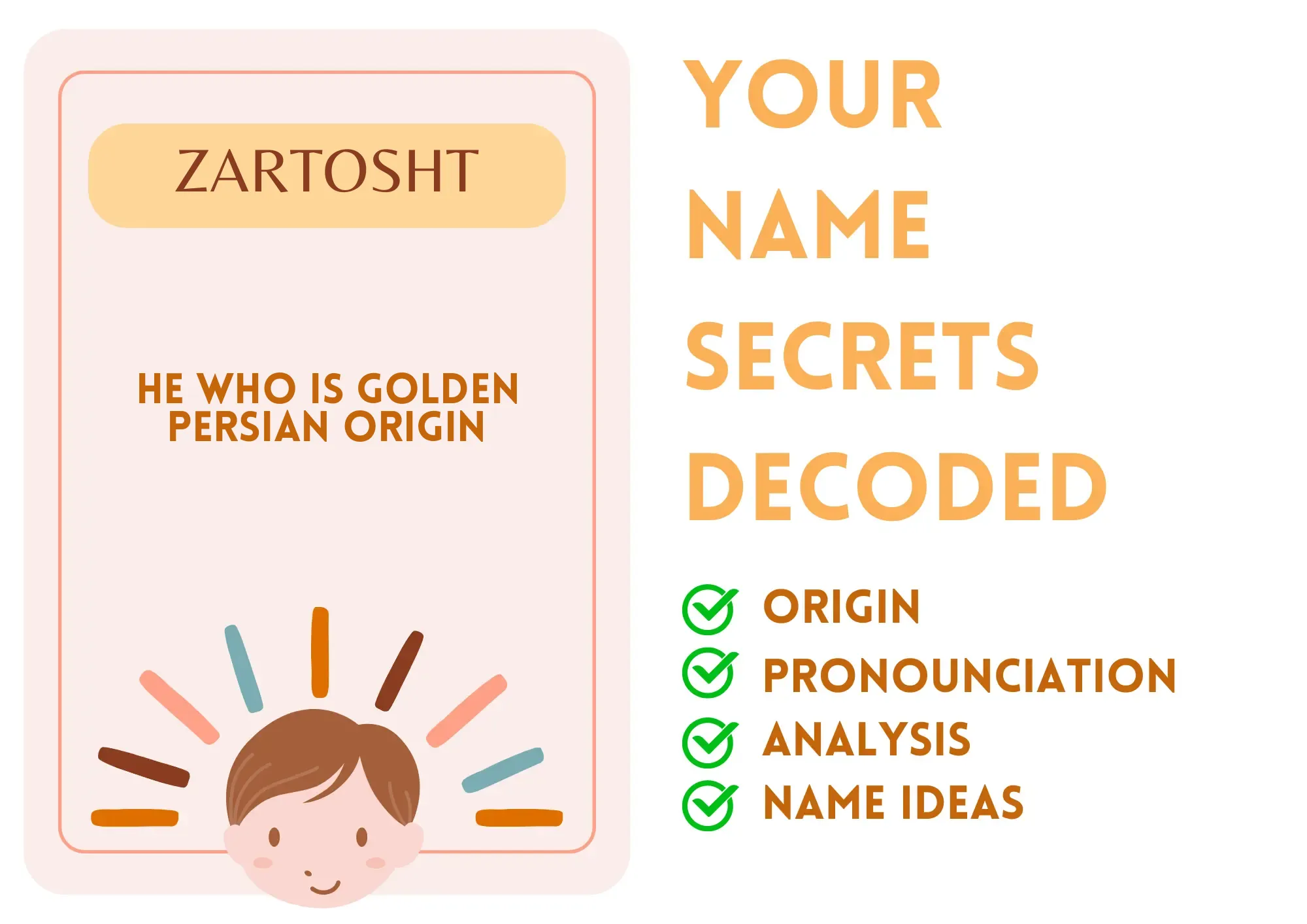
Zartosht
Zartosht, also known as Zoroaster, is a name of ancient Persian origin, associated with the founder of Zoroastrianism. The name translates roughly to 'he who is golden' or 'golden star'. In Zoroastrian culture, Zartosht is a revered figure, representing the prophet and the embodiment of wisdom and divine teachings. His philosophical contributions to dualism and the concept of good versus evil are significant in religious history.
The name Zartosht carries a historical weight and a cultural resonance, evoking feelings of respect, spiritual significance, and intellectual legacy. It is not commonly used as a contemporary name, making it unique and distinctive.
Basic Information
Gender: Boy
Sounds Like: Zar-tosh-t
Pronunciation Explanation: The name has three syllables with emphasis on the first syllable 'Zar,' followed by a softer 'tosh' and a subtle 't' at the end.
Summary and Meaning
Meaning: he who is golden (Persian origin)
Origin: The name Zartosht has Persian origins, linked closely to ancient Persian culture and Zoroastrianism.
Usage: Zartosht is traditionally a masculine name, being associated with the male prophet Zoroaster.
Name Number (Chaldean)
Name Number (Pythagorean)
Popularity (Global Rank)
Overall: 202355
Boys: 72681
Most Popular in
Religious and Cultural Significance
Religion: Zoroastrian
Background: Zartosht is a pivotal figure in Zoroastrianism, where he is seen as the prophet who received revelation from Ahura Mazda, promoting the principles of truth and morality.
Cultural Significance: Zartosht holds a central position in Zoroastrian culture, symbolizing the struggle between good and evil and the quest for truth.
Historical Significance: Historically, Zartosht is significant as the founder of one of the world's oldest monotheistic religions, Zoroastrianism, influencing later religious thought and the development of philosophical concepts surrounding morality, ethics, and dualism.
Popular Culture
Literature and Mythology: Zartosht appears in various ancient texts and religious scriptures related to Zoroastrianism, such as the Avesta.
Movies and Television: Although not often represented as a character, Zartosht's influence permeates various narratives about ancient religions and philosophical discussions in documentaries.
Feelings and Perceptions
Perception: Zartosht is generally viewed with reverence and respect due to its association with a significant religious figure. It evokes thoughts of wisdom and ancient traditions.
Positive Feelings: Unique, profound, historical, spiritual, respected.
Negative Feelings: Might be perceived as obscure or difficult to relate to by those unfamiliar with Zoroastrianism.
Practical Considerations
Ease of Writing and Calling: Zartosht is unique and distinctive, consisting of seven letters. However, it may be slightly challenging for some due to its unique phonetic structure.
Common Typos and Misspellings: Zartosht,Zoratosht,Zartoszht,Zartost
Common Nicknames: Zar,Tosh
Zartosht Popularity
Zartosht Usage and Popularity By Country
| Country | Rank (Overall) |
|---|---|
| Belarus | 1840 |
| Iran | 3082 |
| Sweden | 20238 |
| Romania | 36646 |
| Germany | 81441 |
| Malaysia | 93908 |
| Canada | 149654 |
| United Kingdom | 182431 |
| United States | 216664 |
Zartosht Usage and Popularity By City
| City | Rank (Overall) |
|---|
Compatibility Analysis
Famous Persons Named Zartosht
No results found for Zartosht.
Related Names
Similar Sounding Names:
Zarathustra,Zarathushtra,Zarot,Zar